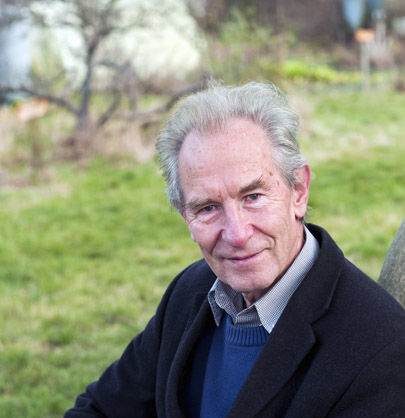Hans-Jürgen Fischbeck
geboren 1938 in Tansania
Hans-Jürgen Fischbeck has a firm place in my childhood memories; he is my godfather. Our visits to the Fischbecks were excursions into a mysterious world. The Fischbecks were part of the GDR and yet not a part of the GDR. Their front door was like a wall. Behind it, they had created a world with its own standards, a life of their own. That world was made up of hymns, saying grace, a piano, lots of things from the West and an old couple who astounded me like two characters straight out of fairytales. Hans-Jürgen’s parents had lived in Tanzania, they were missionaries, they came to their children’s and grandchildren’s birthday celebrations and brought the wide world into our close confines.
Hans-Jürgen Fischbeck was a physicist, an expert on numbers and on Christians. Both these subjects sometimes seemed rather far removed from real life. He had a warm, gentle voice and was almost always serious. Once we were older, he talked about Dietrich Bonhoeffer; the strength of his principles was impressive but at the same time rather alarming, as it subtly gave other people a guilty conscience.
He was an earnest man steeped in the Gospel, led a Spartan life and carried a very old briefcase, no doubt to help the Third World. His political engagement grew out of his deep faith. He wrote papers along with other Christians against the practice and principle of separation, papers formulated as if normal people were not supposed to understand them. Yet Hans-Jürgen was absolutely without vanity, not a man happy to stand in front of a camera. Others put on important faces to go down in history as important figures. He did not. He spoke at the 1989 ecumenical assembly in Dresden, a church congress. The official topic was peace, justice and the preservation of conservation; unofficially, it was about reforms in the GDR.
In 1989 Hans-Jürgen was one of the founders of Demokratie Jetzt (Democracy Now). He wanted democracy but not capitalism; he has always been a religious socialist in my eyes. He dreamed of a world redeemed. That was the basis of his strength, but also of his loneliness. He spent two rather puzzled years representing Democracy Now on the East Berlin city council and later the Berlin House of Representatives. Then he became director of studies at a Protestant academy. His texts always deal with great things: truth, enlightenment, life after death. The fixation on money and profit, he once wrote, has a similarly destructive effect as that of the Stasi.
Hans-Jürgen Fischbeck lives in the countryside in a community, continuing to seek a unity of mental and physical life. There are some who shake their heads over him but he has a special gift for seeking consequences. If there is one word to describe him, then perhaps it is a ‘seeker’.
Stefan Berg

